PRESIDENT Rodrigo R. Duterte won the presidency in 2016 with promises to clean up crime, corruption, and drugs. His presidency was marked by violence, with “extrajudicial killings” of alleged drug lords and addicts plastered on the news almost every day. It also marked the repression of dissuading opinions, with opposition Senator Leila de Lima sent to jail, and charges of sedition filed (then dropped) against his Vice-President, Leni Robredo. Across the world stage, in those years up to now, the US elected Donald J. Trump — twice — on promises of a hard stance against gender, the diversity, equity, and inclusion (DEI) initiative, and immigration. Various swings to a repressive right are being seen at home and abroad — echoing the situations that made people like Ninoy and Cory victims first, then heroes.
Speaking to BusinessWorld during the reopening of the Aquino Center and Museum, Francis Dee, executive director of the Ninoy and Cory Aquino Foundation, and grandson of Ninoy and Cory, said that growing up he wished for an election that he could sit out — that even if he didn’t campaign, or vote, there would be two candidates with the country’s best interests at heart who would both have fair chances of winning. “But every election, basically that I could vote through, has always been an election for the fate of the country. It’s always been the most important election ever.”
“Now, my thinking is — no matter how good an administration is… you’ll never be more than an election away from all of that being reversed.
“In a way, that’s the nature of democracy. The beauty of it is that democracy holds itself accountable. It’s the crucible: if you love democracy, you can’t just love democracy and that’s it. You have to deliver to the people.
“As hard a mistress as democracy is, I think what I’ve also learned in the last few months, years, is that you really still need to keep at it.
“Very broadly, I think the big debate in this country, that became a debate in 2016 is, is it okay for the government to kill Filipinos without due process or anything?
“From 2016 and perhaps even until now, we’ve been on the losing side of the debate. It’s become harder and harder to convince people that life is important. Freedom is important. For a democracy to work, these things are prerequisites. We have to try to win that debate.”
He spoke about a candle-lighting ceremony for victims of Martial Law in September last year, at the anniversary of its declaration on Sept. 21 in 1972. “We had such a hard time lighting the candles. We looked kind of silly.” It had rained prior to the ceremony: “The wicks were wet and we couldn’t light the candles. We kept lighting… for me, that’s what my commitment to democracy looks like. There’s always a risk that it goes out. Maybe it gets lit… when it does get lit, maybe it goes out again. But in the end, you have to keep trying to light it.” — Joseph L. Garcia
